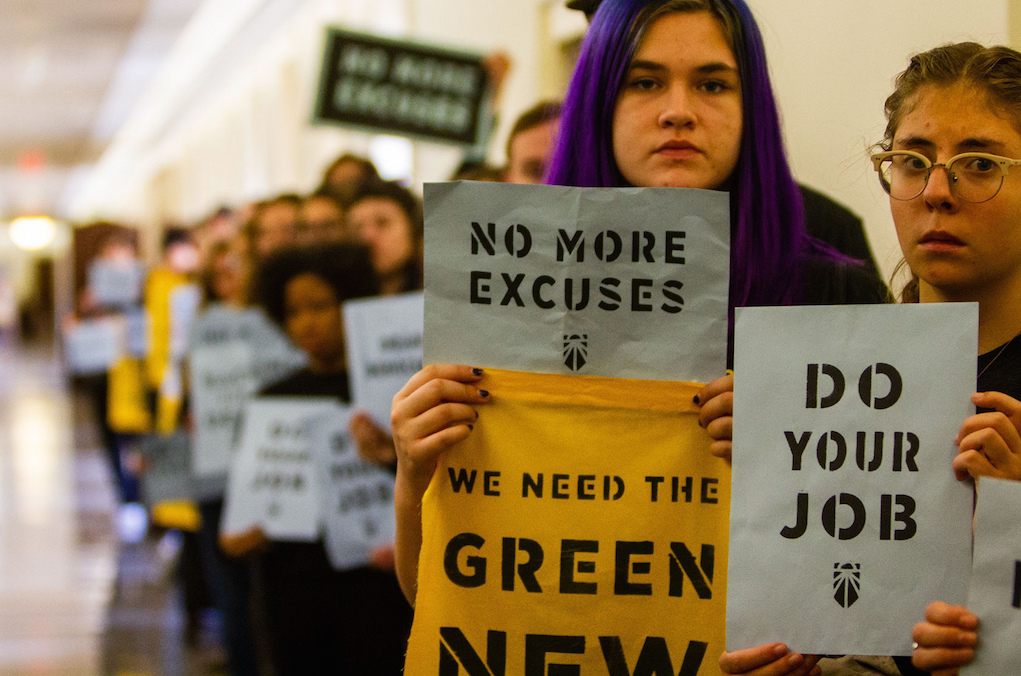There was a saying in the Green Party: “Two Greens, three opinions.” Ecosocialists, perhaps, tend to be slightly more in agreement with a few basic principles, or “Points of Unity.” There are a number of ecosocialist responses to the Green New Deal, converging for the most part around the recognition that though it is not the Green New Deal most of us would prefer, it is the opportunity to move the paralysis of the climate change movement very far in the right — left — direction that our times so desperately need.
This is a series of essays in six voices, from longtime activists who participate in the North American ecosocialist network System Change Not Climate Change. Each was challenged to make their point in 500 words or less. This was intended as a constructive contribution to the wonderful storm of discussion that the Green New Deal has opened up. Read the full series here.
For many decades, scientists have warned that the window for the kind of widespread economic, political, and policy reforms required to avert ecological catastrophe is rapidly closing. Warnings from the scientific community concerning the threat of ecological collapse are universally built around the concepts of “thresholds” and “tipping points” which explicitly refer to threats to the physical preconditions that permit life in the entire biosphere.
These warnings posit a window of opportunity that if not responded to in a dramatic and urgent manner, will be surpassed. The stakes mark a divide between the remaining potential for the exercise of purposeful human action versus the extinguishment of that potential, after which an adequate collective response to ecological crisis becomes perfectly irrelevant as more extreme changes to the climate system become self-generating, locked-in, and irreversible.
So far, authoritative scientific evidence has done nothing to move the world away from a “business-as-usual” socio-economic model that is inherently destructive. “Faster-than-expected” impacts from global warming such as extreme heat and cold, drought, floods, fire, etc. have been met with promises of technological innovation and narrow policy instruments disciplined by neoliberal capitalism — rather than more profound political engagement and proactive emergency planning.
Today’s political and moral calculus could not be more clear. We can either “give in” to the ruling class that guarantees a world firmly on course for imminent, intractable and catastrophic ecological and social crisis, or we can begin to recognize our predicament, mobilize, constructively critique, support, and protect the vision for an unprecedented collective response commensurable to the threat.
The challenge is an immense one. Emergency response to a crisis means there is no longer any time for gradual, incremental or “non-disruptive” reductions in emissions. Meeting the obligations that many scientists now say are critical, getting to “net zero carbon” virtually instantaneously, requires more than an immediate shut down of the planet’s fossil fuel industries.
It also implies a radical retrenchment or collapse of the dominant industries and infrastructure based upon fossil fuel production, including automobiles, aircraft, shipping, petrochemical, synthetic fabrics, construction, agribusiness, industrial agriculture, packaging, plastic production (disposables economy), and the war industries.
Such massive structural changes in our industrial base will only be productively managed if society develops the resiliency and flexibility to withstand the challenges of social transformation. Most importantly, this requires an active participation of organized labour and environmentalists to ensure all people continue to have work, food, shelter and other basic needs met.
Political organizing around the Green New Deal represents a potential breakthrough for many — a recognition of the magnitude and urgency of the social and political changes that are required for civilizational survival. Inevitably, this call to action will require popular mobilization to compensate for the power of intransigent vested corporate and political interests.
The GND stakes new ground and proposes new battle lines for the climate justice movement to authentically challenge the priorities of capitalism over people and the planet. It will be denounced as “radical,” “idealistic,” and even “socialist” by those intent on ratcheting up the ideological battle. Supporters and constructive critics of the GND should prepare themselves to unapologetically lead the charge.
Brad Hornick is a writer, activist and student completing a PhD in Sociology at Simon Fraser University with interests in the political economy of ecological crisis. Brad’s writing has appeared in rabble.ca, socialistproject.ca, and ricochet.media, and several other publications in addition to Resilience. He has worked as staff at the David Suzuki Foundation and run a communications and design business with more than sixty different organizations, primarily environmental NGOs. He was the webmaster and editor for the System Change Not Climate Change ecosocialist network, a founder of Climate Convergence and the Vancouver’s Global Warming Cafes.
This article was first published on Resilience.org.
Photo: Becker1999/Flickr
Help make rabble sustainable. Please consider supporting our work with a monthly donation. Support rabble.ca today for as little as $1 per month!




